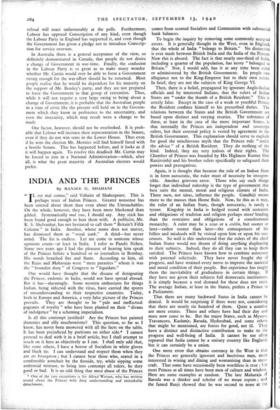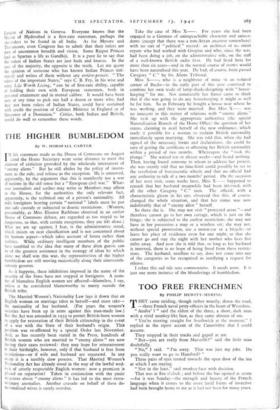INDIA AND THE PRINCES
By RANJEE G. SHAHANI
" IL est mal connu," said Voltaire of Shakespeare. This is I perhaps truer of Indian Princes. Greater nonsense has been uttered about them than even about the Untouchables. On the whole, however, they have been more blackened than gilded. Systematically mal vus, I should say. Any stick has been found good enough to beat them with. A publicist, Mr. K. S. Shelvankar, has not hesitated to call them " Britainl Fifth Column " in India. Another, whose name does not matter, has dismissed them as " royal junk." A third—but never mind. The list is endless. Let me come to someone whose opinions count—at least in India. I refer to Pandit Nehru. Some two years ago I had the pleasure of hearing him speak of the Princes before a hundred or so journalists in Bombay. His words breathed fire and flame. According to him, all the Rajas and Maharajas were " mere parasites " whom it was the " bounden duty " of Congress to " liquidate."
One would have thought that the disease of denigrating the Princes, endemic in India, would not have spread abroad. But it has—alarmingly. Some western enthusiasts for things Indian, being infected with the virus, have carried the spores of misunderstanding to their respective countries. Today, both in Europe and America, a very false picture of the Princes prevails. They are thought to be " pale and ineffectual pageants of royalty " who have been planted on their " divans of indulgence " by a scheming imperialism.
Is all this contempt justified? Are the Princes but painted dummies and silly anachronisms? This question, so far as I know, has never been answered with all the facts on the table. It has been prejudiced by partisans on either side.* I cannot pretend to deal with it in a brief article, but I shall attempt to touch on it here as objectively as I can. I shall only add that, like some others, I have a horror of Socialists in white gloves and black tie. I can understand and respect them when they are en bourgeron ; but I cannot bear those who, seated in a comfortable armchair by the fireside, try, while sipping some ambrosial mixture, to bring into contempt all rulers, be they good or bad. It is an odd thing that most abuse of the Princes
* One of the rare exceptions is Sir Alfred Watson, who has written round about the Princes with deep understanding and remarkable detachment.
comes'from scented Socialists and Communists with substantial bank balances.
To begin the inquiry by removing some commonly accepted errors. It is generally thought in the West, even in England, that the whole of India " belongs to Britain." No distinction is ever made between British India and the India of the Princes. Now this is absurd. The fact is that nearly one-third of India, including a quarter of the population, has never " belonged to Britain." Nor, I would add, has it at any time been ruled or administered by the British Government. Its people owe allegiance not to the King-Emperor but to their own rulers. In brief, they are not the subjects of King George VI.
Then, there is a belief, propagated by ignorant Anglo-Indian officials and by interested Indians, that the rulers of Indian States are " under the thumb of a British Resident." This is utterly false. Except in the case of a weak or youthful Prince, the Resident confines himself to his prescribed duties. The relations between the States and the British Government are based upon distinct and varying treaties. The substance of these, at least in the case of the more important States, is that internally the Princes are independent and sovereign rulers, but their external policy is vested by agreement in the British Government. This explanation should serve to explode for good the mischievous myth that the Princes rule " under the advice " of a British Resident. They do nothing of the kind. Indeed, they are very jealous of their rights. The Chamber of Princes was founded by His Highness Kumar Shri Ranjitsinhji and his brother rulers specifically to safeguard their powers and prerogatives.
Again, it is thought that because the rule of an Indian State is in form autocratic, the ruler must of necessity be irrespon- sible. Another grievous error. Those who say such things forget that individual rulership is the type of government that best suits the mental, moral and religious climate of India. There men, not ideas, influence the people. Gandhiji means more to the masses than Home Rule. Now, be this as it may, the ruler of an Indian State, though autocratic, is rarely a tyrant. Kingship in India is hedged round with restraints and obligations of tradition and religion perhaps more' binding than the restraints and obligations of a constitutional monarchy. A ruler may be a zozo or a cretin, but sooner or later—rather sooner than later—the consequences of his follies and misdeeds will be visited upon him or upon his suc- cessors. So well is this understood that the rulers of the chief Indian States would not dream of doing anything displeasing to their subjects. Indeed, they do all they can to keep them satisfied. The Princes have known how to combine autocracy with paternal solicitude. They have never fought shy of progress, and have strained every nerve to improve the material and moral condition of their people. But experience has taught them the inevitability of gradualness in certain things. If they have not given their subjects full democratic institutions, it is simply because a real demand for these does not exist. The average Indian, at least in the States, prefers a Prince to a Parliament.
That there are many backward States in India cannot be denied. It would be surprising if there were not, considering that there are nearly six hundred of them. Quite a number are mere estates. These and others have had their day and must now cease to be. But the major States, such as Mysore, Travancore, Kashmir, Baroda, Hyderabad, and some others that might be mentioned, are forces for good, not ill. They have a distinct and distinctive contribution to make to the progress and wellteing of India. It cannot be too often repeated that India cannot be a unitary country like England, but it can certainly be a union.
One more error that obtains currency in the West is that the Princes are generally ignorant and lascivious men, more interested in wining and dining and womanising than in state- craft. That some have occasionally been worthless is true ; but most Princes at all times have been men of culture and wisdom.
Here are some examples at random. The late Maharaja of Baroda was a thinker and scholar of no mean repute ; and the famed Ranji showed that he was second to none at the League of Nations in Geneva. Everyone knows that the Nizam of Hyderabad is a first-rate statesman, perhaps the shrewdest to be found in all India. As for Mysore and Travancore, even Congress has to admit that their rulers are men of uncommon breadth and vision. Some Rajput Princes lead as Spartan a life as Gandhiji. It is a pure lie to say that the rulers of Indian States are just fools and knaves. In the case of the majority, the opposite is the truth. Let me quote the opinion of someone who has known Indian Princes inti- mately and writes of them without any arrilre-pensee. " The rulers of the important States," says C. B. Fry, in his wise and witty Life Worth Living, " can be of first-rate ability, capable of holding their own with European statesmen, both in personal attainment and in mental calibre. It would have been easy at any time to pick out half a dozen or more who, had they not been rulers of Indian States, could have sustained with credit the position of Cabinet Minister in England or of Governor of a Dominion." Critics, both Indian and British, would do well to remember these words.



























 Previous page
Previous page